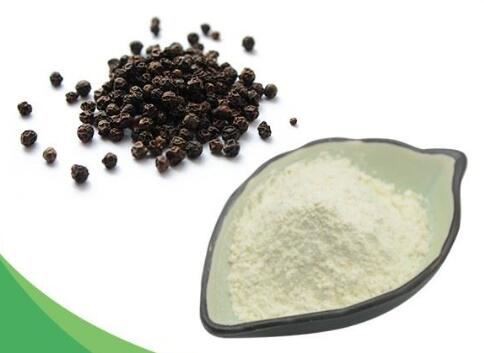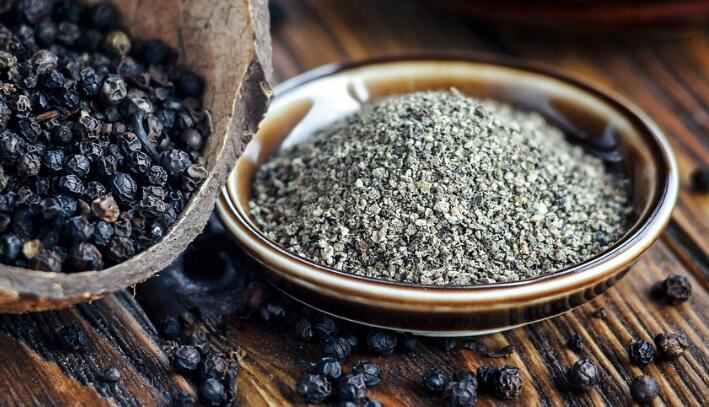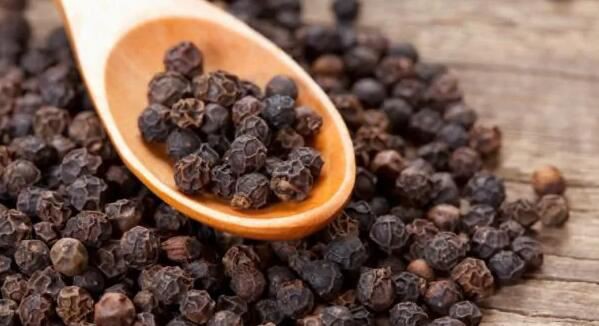What is black pepper extract piperine?
Black pepper extract piperine is produced from black pepper species Piper nigrum Linn. It has a natural pepper aroma. It is a green to yellow fine powder. Black Pepper has various physiological activities including , and .
Active ingredients of Piperine, a substance that gives black pepper its unique pungent and spicy aroma. Black pepper also contains a wide variety of minerals such as potassium, calcium, and magnesium as well as vitamin B1 (thiamine), vitamin B2 (riboflavin), vitamin B6, and more.

Basic Information:
Product name | Piperine |
Latin name | Piper Nigrum L. |
Harvest season | Autumn |
Part used | Seeds |
Active Ingrdients | Piperine |
Cas No | 394-62-2 |
Molecular Formula | C17H19NO3 |
Test Method | HPLC |
Application | Dietary Supplement |
Black Pepper Extract Piperine Benefits:
1.Increasing Supplement/Drug Bioavailability
Black pepper extract piperine was identified in 1979 as the first-ever compound ever that enhances the “bioavailability” of other substances. In other words, piperine increases the ability of the body to use nutrients and drugs.This means that lower or fewer doses of the drug can be used to achieve the same effect. This is very beneficial when it comes to drugs that have unpleasant side effects!
1)
Piperine black pepper extract may protect against oxidative stress by removing free radicals (such as hydroxyl and superoxide) from the body.In a small trial on 20 people with pancreatitis, a combination of curcumin (500 mg) and piperine (5 mg) improved their status (lower fat peroxidation and MDA and higher glutathione levels). Combinations with the same proportion of curcumin and piperine also improved status in 3 trials on over 100 people with metabolic syndrome, almost 100 people with chronic lung disease, and 40 people with osteoarthritis.
2) Inflammation
In a clinical trial on over 100 people with type 2 diabetes or metabolic syndrome, a combination of curcumin and piperine had effects (measured as lower CRP levels). However, the mix contained 100x more curcumin than piperine. A similar mix also reduced inflammation (reduced levels of IL4, IL-6, and CRP) in a clinical trial on 40 people with knee osteoarthritis. Piperine reduced both short- and long-term symptoms of inflammation in rats.
3) Improving Blood Cholesterol
In 2 clinical trials on over 200 people with type 2 diabetes or metabolic syndrome, a combination of 1,000 mg/day curcumin and 10 mg/day piperine lowered total cholesterol and LDL- and VLDL cholesterol (the “bad”type) while increasing HDL-cholesterol (the “good” type).
4) Metabolic Syndrome
As previously mentioned, the combination of curcumin (1,000 mg/day) and black pepper extract piperine (10 mg/day) improved oxidative, inflammatory, and blood fat status in 2 clinical trials on over 200 people.
5) Lowering Blood Sugar
In a clinical trial on 100 people with type 2 diabetes, a combination of 500 mg/day curcumin and 5 mg/day piperine lowered blood sugar and reduced liver damage. In diabetic mice, a low dose of piperine (20 mg/kg body weight) reduced blood sugar. However, higher doses increased blood sugar levels.
6) Vitiligo
Vitiligo is a long-term condition in which skin patches lose pigmentation. In a clinical trial on 63 people with vitiligo on the face, a combined therapy of piperine and narrowband UV-B radiation enhanced skin repigmentation [39].
Animal and Cell Research (Lack of Evidence)
No clinical evidence supports the use of piperine for any of the conditions listed in this section. Below is a summary of the existing animal and cell-based research, which should guide further investigational efforts. However, the studies should not be interpreted as supportive of any health benefit.
7.Cognitive Function
Multiple animal studies suggest that piperine can boost brain function .
8.Depression
Piperine black pepper extract had effects in mice subjected to chronic stress. This effect was linked to the increased production of new brain cells and increased BDNF levels in the hippocampus. Depression is common in epilepsy. In rats with epilepsy, dietary piperine reduced symptoms of depression by increasing serotonin levels.
9.Parkinson’s Disease
In mice with Parkinson’s disease, piperine improved motor coordination. It also improved brain function and learning. Increasing dopamine levels is the most common way to treat Parkinson’s disease. Piperine inhibits MAO-A and MAO-B, the enzymes that break down dopamine, possibly increasing overall dopamine levels in the brain. Piperine also prevented the death of dopamine neurons in mice. It protected neurons because it is an , is , and prevents programmed cell death.
10.Allergies
Piperine reduces inflammation and suppresses the immune system, making it a good candidate for treating and preventing allergies. In mice, piperine reduces sneezing, nose-rubbing, and other symptoms of allergies. It dose-dependently decreased histamine, nitric oxide, IgE, and inflammatory cytokines IL-6 and IL-1b.
11.Pain
As little as 5 milligrams of piperine per kilogram of body weight reduced pain in mice and rats. In humans, this would be roughly equivalent to 1/6th of a teaspoon. Another study in mice showed that higher doses, around 30 to 70 mg per kg body weight, had a similar effect to indomethacin, a pain-relieving drug similar to aspirin or ibuprofen.
12.Weight Loss
Rats with high levels of fats and cholesterol in the blood lost weight and fat mass when piperine was added to their diet.
13.Lowering Blood Pressure
Piperine caused a significant drop in average blood pressure when fed to rats. In another study in rats, it was able to partially prevent the increase in blood pressure caused by a drug (NOS inhibitor).
14. Preventing Gallstones
Gallstones are formed from crystallized cholesterol in the gallbladder. Piperine prevented cholesterol gallstone formation in mice by reducing the size of cholesterol crystals and decreasing the transport of cholesterol from the liver into the gallbladder.
15. Diarrhea
Piperine prevented diarrhea in mice. In rabbits and guinea pigs, it worked as well as loperamide, another drug used to treat diarrhea – but without causing any of loperamide’s usual side effects.
16. Ulcers
Piperine prevented the formation of ulcers in rats and mice. It was effective against ulcers caused by stress, hydrochloric acid, and the pain reliever indomethacin.
Heliobacter pylori is a bacteria that causes chronic stomach inflammation, peptic ulcers, and, in rare cases, stomach cancer. Piperine inhibited H. pylori from growing and sticking to cells, which may reduce the chances of infection.
17. Seizures
In many (but not all) rodent models of epilepsy, piperine reduced the number of seizures and deaths from seizures with doses as low as 10 mg per kg of body weight.
18. Cancer
In skin cancer (melanoma), piperine prevented tumor cells from spreading to other parts of the body (metastasis) leading to significantly better survival rates in mice.
It also decreased tumor growth and metastasis in mice with breast cancer.

Application:
1. As pharmaceutical raw materials for arthritis, rheumatism, anti-inflammation, detumescence and so on, it is mainly used in pharmaceutical field;
2. As products effective ingredients for improving blood circulation and soothing the nerves, it is mainly used in health product industry;
3. As active ingredients of skin care products, it is mainly used in cosmetic industry.
Piperine Dosage:
Because piperine is not approved by the FDA for any conditions, there is no official dose. Users and supplement manufacturers have established unofficial doses based on trial and error. Discuss with your doctor if piperine may be useful as a complementary approach in your case and which dose you should take.
In humans, a dose of 20 mg per day can increase the bioavailability of curcumin.
There have been few human studies for the other benefits of piperine. However, these daily doses have been effective in mice and rats:
For pain relief: 30 – 70 mg/kg body weight.
To improve brain function: 5 – 50 mg/kg body weight.
To lower blood pressure: 10 mg/kg body weight.
For effects: 20 mg/kg body weight.
Ordinary black pepper is around 0.4 – 7.0% piperine. Therefore, to get 1 full gram of piperine from black pepper, a person would have to eat over six teaspoons of black pepper! Unsurprisingly, it is recommended to use piperine supplements for these doses instead.

The Best black pepper extract piperine Supplier
Undersun enjoys long term relationships with our clients because we focus on customer service and providing great products. If you are interested in our products, we are flexible with the customization of orders to suit your specific need and our quick lead time on orders guarantees you’ll have great tasting our products on-time.
We also focus on value-added services. We are available for service questions and information to support your business.
Why Choose Undersun black pepper extract piperine?
Undersun specialize in piperine black pepper extract for several years, we supply products with competitive price, and our product is of the highest quality and undergoes strict, independent testing to ensure that it is safe for consumption around the world.
Where to buy piperine black pepper extract ?
Just send email to [email protected], or submit your requirement in bottom form, we are of service at any time!
Hot Tags: black pepper extract piperine, suppliers, manufacturers, factory, wholesale, buy, price, quotation
Curated Products
Provide Curated Products for all product over $100
Handmade
We ensure the product quality that is our main goal
Natural Food
Return product within 3 days for any product you buy
Free home delivery
We ensure the product quality that you can trust easily







